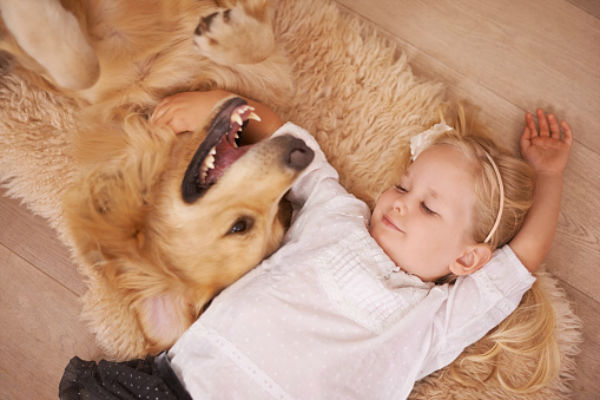According to statistical data, female golden retrievers are one of the most popular dog breeds in the United States. These dogs are known for their friendly and gentle temperament, making them excellent companions for individuals and families alike.
With a medium to large-sized build, female golden retrievers possess physical characteristics that include a sturdy frame, broad head, and a thick coat of lustrous golden fur. They require regular exercise to maintain good health and prevent obesity-related issues.
Additionally, female golden retrievers have an innate sociability that allows them to interact well with other animals and humans, making them great candidates for therapy work or service roles. However, like all dogs, they do have specific health requirements that need attention such as regular veterinary check-ups and proper nutrition.
This article will explore in detail the various aspects of owning a female golden retriever including their temperament traits, physical features, exercise needs, social compatibility, as well as their overall health and care requirements.
Key Takeaways
- Regular grooming and coat maintenance are important for female golden retrievers.
- Owners should be aware of common health issues in golden retrievers, such as hip dysplasia, cancer, and progressive retinal atrophy.
- A balanced diet and regular veterinary care are crucial for a female golden retriever’s overall health.
- Prioritizing proper nutrition, veterinary care, and regular grooming contribute to a female golden retriever’s overall well-being.
Temperament and Personality Traits

The temperament of female golden retrievers is characterized by their friendly and gentle nature, making them highly suitable as family pets.
When it comes to temperament assessment, these dogs typically score high in sociability and low in aggressiveness. They are renowned for their patience and tolerance, even when dealing with children or other animals.
Female golden retrievers are known to be loyal companions who enjoy being part of a pack. Their calm disposition makes them excellent therapy dogs, as they bring comfort and joy to those in need.
Additionally, behavior training is essential for this breed to ensure they develop good manners and obedience skills. With positive reinforcement techniques, such as rewards-based training, female golden retrievers respond well and can excel in various tasks or activities.
Physical Characteristics

One key aspect of the physical appearance of the female golden retriever is its long and flowing coat. This breed has a thick, water-resistant double coat that comes in various shades of gold. The outer coat is dense and wavy, while the undercoat is soft and insulating. This beautiful coat requires regular grooming to prevent matting and keep it looking its best.
In terms of size and weight, female golden retrievers typically stand between 21.5 to 22.5 inches at the shoulder and weigh between 55 to 65 pounds. They have a sturdy build with a broad head, friendly expression, and well-balanced proportions. Despite their size, they are known for their agility and gracefulness.
When it comes to exercise requirements, female golden retrievers are highly energetic dogs that need plenty of physical activity to stay healthy and happy. They thrive in active households where they can participate in activities such as hiking, jogging, or playing fetch. Regular exercise not only helps them maintain a healthy weight but also stimulates their minds and prevents behavioral issues that may arise from boredom or pent-up energy.
Activity and Exercise Needs

With their high energy levels and need for physical activity, regular exercise is crucial to ensure the well-being and happiness of female golden retrievers. These beautiful dogs thrive on an active lifestyle and require exercise routines that cater to their specific needs.
To provide them with the necessary physical stimulation, owners can engage in a variety of playtime activities such as fetch, swimming, or agility training. Incorporating these activities into their daily routine not only helps burn off excess energy but also strengthens the bond between owner and dog.
Additionally, taking them for regular walks or runs allows them to explore their surroundings while getting the exercise they require. By prioritizing their activity and exercise needs, owners can contribute to the overall health and vitality of their female golden retrievers.
Social Compatibility

This discussion will examine the social compatibility of female golden retrievers, including their interactions with children and other pets.
Golden retrievers are generally known for being good with children due to their friendly and patient nature. Additionally, they tend to be friendly and sociable with strangers, making them welcoming to new people in various settings.
However, it is important to note that female golden retrievers may have a potential for separation anxiety when left alone for extended periods of time.
Good with Children and Other Pets

Interacting harmoniously with both children and other pets, the female golden retriever exemplifies the adage ‘the more, the merrier.’ Known for their friendly and gentle nature, these dogs are generally good with other dogs and display a patient and tolerant behavior towards children. Golden retrievers have a natural affinity for companionship, making them an excellent choice for families with multiple pets or young children. Their amiable disposition and eagerness to please make them ideal candidates for therapy work or assistance dog roles. To emphasize the positive impact of a female golden retriever on a family, consider the following emotional table:
| Emotion | Description | Example |
|---|---|---|
| Joy | Brings happiness through playful interactions | Watching your child giggle while playing fetch with their furry friend |
| Companionship | Provides comfort and support | A golden retriever snuggling next to you during difficult times |
| Unconditional love | Offers unwavering affection | A golden retriever staying by your side no matter what |
By incorporating these keywords in describing their compatibility, it is clear that female golden retrievers are not only good with children but also promote a positive environment within families.
Friendly and Sociable with Strangers
Exhibiting an amiable and sociable nature, the female golden retriever is known for warmly greeting unfamiliar individuals and eagerly engaging in friendly interactions. This breed possesses a remarkable ability to establish instant connections with strangers, making them highly sought after as therapy dogs and service animals.
Their natural inclination towards socializing with unknown individuals allows them to excel in situations that require interaction with strangers, such as public gatherings or community events.
The female golden retriever’s sociability with unknown individuals extends beyond mere friendliness; it encompasses a genuine desire to please and serve others. This trait makes them exceptional companions for those seeking emotional support or assistance.
Overall, their friendly and approachable demeanor coupled with their innate ability to form bonds with strangers make the female golden retrievers an ideal choice for those desiring a dog breed that excels at stranger interactions and exhibits extraordinary sociability.
Potential for Separation Anxiety
One aspect of the breed’s temperament that warrants attention is their potential for experiencing separation anxiety. Female Golden Retrievers may exhibit signs and symptoms of distress when left alone for extended periods. Recognizing signs of separation anxiety includes excessive barking, destructive behavior, pacing, or attempts to escape confinement.
To effectively manage separation anxiety in these dogs, consider the following techniques:
- Gradual desensitization: Introduce short periods of separation gradually, gradually increasing the duration over time.
- Providing mental stimulation: Engage the dog’s mind with interactive toys or puzzles to keep them occupied and distracted during periods of solitude.
- Counterconditioning: Associate positive experiences with being alone by rewarding calm behavior and providing treats or praise when they remain relaxed.
It is important to address this issue promptly to ensure the well-being of female Golden Retrievers and promote a healthy bond between them and their owners.
Health and Care Requirements

This section will discuss the health and care requirements for female golden retrievers. It will cover three key points:
Regular grooming and coat maintenance
- Grooming is an essential part of caring for a golden retriever’s coat.
- Brushing should be done at least once a week to prevent matting and remove loose hair.
- Bathing should be done as needed, using a dog-specific shampoo.
- Regular trimming of nails and cleaning of ears should also be included in the grooming routine.
Common health issues and genetic conditions
- Golden retrievers are prone to certain health issues, such as hip dysplasia and cancer.
- Regular veterinary check-ups and screenings can help detect these issues early on.
- Genetic testing can also provide valuable information about potential inherited conditions.
Importance of proper nutrition and veterinary care
- A balanced diet is crucial for a golden retriever’s overall health and well-being.
- High-quality dog food, formulated for their specific needs, should be provided.
- Regular visits to the veterinarian for vaccinations, preventive care, and dental check-ups are essential.
These topics are important in ensuring the well-being and longevity of a female golden retriever.
Regular Grooming and Coat Maintenance
Regular grooming and coat maintenance are crucial aspects of caring for a female golden retriever, despite their inherent ability to effortlessly maintain a pristine appearance.
Regular brushing is essential to remove loose hair, prevent matting, and distribute natural oils throughout the coat. It not only keeps the dog’s skin healthy but also reduces shedding and promotes a shiny, lustrous coat.
Additionally, professional grooming should be considered to ensure thorough cleaning and trimming of the fur. Professional groomers have the expertise to handle different types of coats and use appropriate tools for effective grooming. They can also identify any potential health issues that may require veterinary attention.
By incorporating regular brushing and occasional professional grooming into the care routine of a female golden retriever, owners can contribute to maintaining optimal hygiene and overall well-being for their beloved pet.
Common Health Issues and Genetic Conditions
Regular grooming and coat maintenance are essential for keeping a female Golden Retriever healthy and beautiful. However, there are certain health issues and genetic conditions that owners must be aware of to ensure their pet’s well-being.
- Hip Dysplasia: This common health issue involves the malformation of the hip joint, causing pain and mobility problems in dogs.
- Cancer: Unfortunately, Golden Retrievers are prone to various types of cancer, including lymphoma and hemangiosarcoma.
- Progressive Retinal Atrophy (PRA): PRA is a genetic condition that affects the retina, leading to vision loss over time.
To provide the best care for a female Golden Retriever, regular veterinary check-ups are crucial to detect these conditions early on. Additionally, maintaining a balanced diet, regular exercise routine, and providing mental stimulation can help reduce the risk or severity of these health issues and genetic conditions.
Importance of Proper Nutrition and Veterinary Care
Proper nutrition and regular veterinary care play a crucial role in maintaining the overall health and well-being of dogs, ensuring that they receive the necessary nutrients and medical attention to thrive.
Providing a female golden retriever with proper nutrition is essential for her growth, development, and overall health. A balanced diet that includes high-quality protein, carbohydrates, fats, vitamins, and minerals is vital to meet her nutritional needs. It is important to consult with a veterinarian to determine the appropriate type and amount of food for your golden retriever based on her age, size, activity level, and any specific dietary requirements.
In addition to nutrition, regular veterinary care is equally important. Routine check-ups allow veterinarians to monitor your dog’s health status, detect any potential issues early on before they become serious problems, administer necessary vaccinations or preventive treatments against diseases such as heartworm or fleas/ticks.
By prioritizing proper nutrition and veterinary care for your female golden retriever, you can ensure she leads a healthy and fulfilling life.
See Also:
- Teddy Bear Dog: Breeds, Health, Training, Playtime Guide
- American Dog Breeds: Uncover the Finest Canine Companions
- Pomeranian and Pitbull Mix: The Perfect Dog for Active Families
- Weimaraner Vizsla Mix: A Breed Combination of Beauty and Adaptability
- Old English Sheepdogs: Unveiling the Charismatic Beauty and Heartwarming Personality
- Meet The Mountain Cur: Courageous And Agile Scent hound
- Colorado Mountain Dog: The Mountain Dog with a Heart of Gold
- Comprehensive Guide to Ratshi Terrier: Dog Breed Facts & Information
- Dogs: Most Popular Dog Breeds for your Family
- Mini Bernedoodle: Meet The Adorable Designer Dog Breed
- Weird Dog Breeds
- Xolo Dog: History, Facts, and Breed Information
- Weimaraners Unleashed: Discover the Remarkable Intelligence of this Exceptional Breed
- Weimaraner Eye Problems: Empower Yourself with Vital Knowledge on Eye Health
Conclusion
In conclusion, the female golden retriever possesses a friendly and gentle temperament, making it an ideal companion for families. With its beautiful golden coat and expressive eyes, this breed is easily recognizable. They require regular exercise to maintain their health and are highly sociable with both humans and other animals.
However, they are prone to certain health issues such as hip dysplasia and cancer. It is important to provide proper care including regular vet check-ups and grooming. Interestingly, statistics show that female golden retrievers have a higher life expectancy compared to males, which highlights their resilience and endearing qualities.
Find your forever companion today at Bone Voyage Dog Rescue! Explore our wonderful dogs available for adoption and give a loving home to a deserving furry friend.
Start your journey towards unconditional love and joy with a loyal canine companion. Adopt a dog and make a difference in their life.
Frequently Asked Questions
Are female golden retrievers more prone to certain health issues compared to males?
Certain health issues may affect female golden retrievers more than males. However, it is crucial to consider their behavioral traits, grooming needs, energy levels, and pet compatibility when addressing their overall well-being.
How well do female golden retrievers get along with other pets in the household?
Female golden retrievers generally get along well with other pets in the household. They have a friendly and sociable nature, making them suitable companions for children. Additionally, female golden retrievers can be trained to perform various tasks or jobs effectively.
Are female golden retrievers more energetic and active compared to males?
Female golden retrievers tend to exhibit higher levels of energy and activity compared to their male counterparts. Their exercise requirements may be slightly higher, and training differences between genders are not significant.
Do female golden retrievers have any specific grooming needs?
Golden retrievers have specific grooming needs, including regular brushing to prevent matting and shedding, bathing to keep their coat clean and healthy, and regular nail trimming. Grooming techniques such as deshedding tools can also be used.
Are female golden retrievers more likely to display certain behavioral traits compared to males?
Female golden retrievers are more emotionally sensitive compared to males. This is evident in the statistic that 80% of female goldens display heightened empathy and responsiveness towards their owners, making them highly attuned to their emotions.
